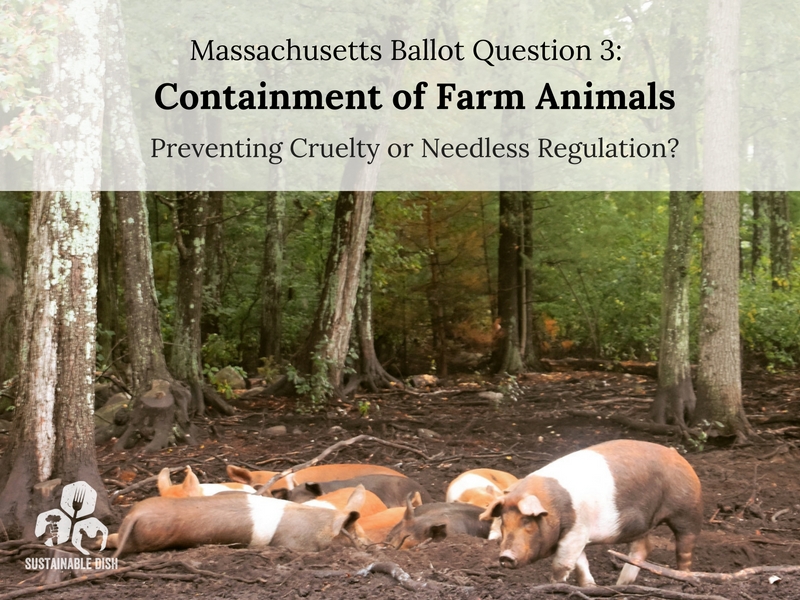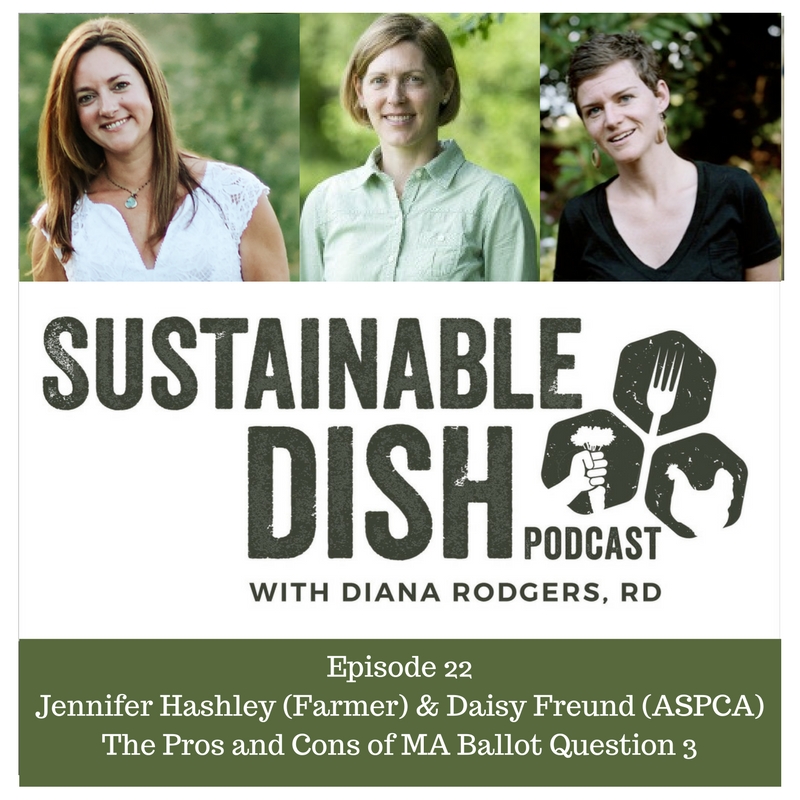 Recently, the ASPCA reached out to me to see if I could help support Question 3 in Massachusetts. Personally, I was feeling pretty conflicted about the proposal, also known as The Massachusetts Minimum Size Requirements for Farm Animal Containment. It’s on the November 8, 2016, ballot in Massachusetts as an indirect initiated state statute. See the actual petition here.
Recently, the ASPCA reached out to me to see if I could help support Question 3 in Massachusetts. Personally, I was feeling pretty conflicted about the proposal, also known as The Massachusetts Minimum Size Requirements for Farm Animal Containment. It’s on the November 8, 2016, ballot in Massachusetts as an indirect initiated state statute. See the actual petition here.
A “yes” vote supports this proposal to prohibit the sale of eggs, veal, or pork of a farm animal confined in spaces that prevent the animal from lying down, standing up, extending its limbs, or turning around.
A “no” vote opposes this proposal.
I invited Daisy Freund, Director of Farm Animal Welfare for the ASPCA onto my podcast to discuss the pros, and then invited Jennifer Hashley, Director of New Entry Sustainable Farming Project and a small-scale farmer to talk about the cons. Check out the full episode here.
If approved, this law would prohibit breeding pigs, calves raised for veal, and egg-laying hens from being held in confined spaces. Question 3 defines confined as meaning that which “prevents the animal from lying down, standing up, fully extending its limbs, or turning around freely.”[1] This law would also apply to business owners who knowingly sell pork, veal, or eggs from animals held in this way, even if the source is outside of Massachusetts. Exceptions to this confinement rule include temporary holding cells for transportation, fairs, medical research, veterinary exams, and other purposes. The state attorney general would administer the new law, which would come with a maximum fine of $1,000 could be levied for each violation. Daisy pointed out that the bill would promote the farming practices that Jen Hashley and the farm where I live follow. Our chickens are out on pasture during the growing season and the pigs roam freely. The animals are not confined.
While I fully support efforts to end animal suffering, local farmers that I spoke to have some concerns about laws governing exactly how farmers should raise their animals. My husband is against any law that tells him “how to farm.” He feels that he knows how best to manage his animals, and that laws like this can often have unintended consequences. After reading the proposal in detail, I am a bit worried over the way we close in our chickens at night – it may not be considered “humane” according to this new law. We have hundreds of birds that are out on pasture during the day, and are safely enclosed in their roosting house at night. The bill states that animals may only be “confined” for up to six hours in a 24 hour period. We close ours in for more than six hours, for their safety from predators. Our roosting house is small and mobile, and doesn’t provide the 1.5 square feet of “usable floor space” per bird. Chickens actually like to huddle together for warmth. We provide perches (they look like little ladders) inside the house. There seems to be an exception within the chicken houses in the below description:
“Usable floor space” means the total square footage of floor space provided to each hen, as calculated by dividing the total square footage of floor space provided to hens in an enclosure (including both ground space and elevated flat platforms) by the number of hens in that enclosure.”
But the perches we have aren’t flat platforms. I’m not 100% sure that we would be considered “humane,” even though we consider our handling practices far above any CAFO farm. Anyone wanting to give us a hard time could certainly challenge that our perches are not flat platforms and potentially shut us down for inhumane handling. Although it’s not likely to get to that level, I wrote about a situation on Jennifer Hashley’s farm where a neighbor didn’t like the way she was raising her rabbits. Even though her rabbits were considered healthy and humanely raised by the MSPCA and the vet, that did not stop the woman from dragging these farmers through the mud. They were called “rabbit killers” during the local Forth of July parade. Nosy neighbors, who know nothing about farming and looking to stir up trouble can easily do so, and laws like Question 3 can provide the ammunition.
Question 3 also reminds me of some of the issues Mark Baker continues to face on his Michigan farm, when the state ruled that he should shoot his pigs because they didn’t fall within the state definition of a “domestic pig.” I interviewed Mark on my podcast about this last year. The stress and expense that result from blanket laws governing how farmers should raise their animals can really harm smaller producers who are not on the industrial scale and don’t fit within the narrow box of CAFO farming.
[Tweet “Question 3: Humane Treatment for Animals or Needless Regulation?”]
Creating more layers of legislation can make it difficult for small farmers to compete against the big guys. Jen Hashley pointed out that the one family farm in Massachusetts that would be affected by this rule already saw their business go from 10,000 birds to about 3,000 from a law requiring inspection of eggs. The farm had to either hire an additional inspector or cut down it’s production (and profits). Consumers of eggs have many options for great choices like pasture-raised, organic, cage free or “vegetarian fed” eggs. She also said that creating this regulation could set precedent for more, “Today it’s more space, but what might happen tomorrow.” Although the ASPCA doesn’t have a clear vegan agenda, the Humane Society of the United States does, and their spending on Question 3 was over $1,000,000. Their goals are not only to reduce animal suffering but to reduce animal farming in general.
“The longer game seems to be to get consumer-driven legislation passed in a liberal state,” Cathy Stanton, a professor at Tufts said in a recent op-ed article. “It’s a smart strategy. And it’s hard to argue against the images of miserable animals in crates or the stories about what a chicken’s short life is like in a giant shed with up to a million other caged birds. But tackling large-scale problems with this kind of large-scale solution runs the risk of hurting smaller businesses while actually ultimately benefiting those who are now the worst offenders.”
Jen was also concerned about how this new rule would be enforced. How many resources would be required to ensure all eggs and meat in Massachusetts stores and institutions were coming from “approved” farms? Is this a good use of our state’s time and money? Could consumer demand for higher quality food be a better driver for change?
So, while it seems that the only opponents to Question 3 are “big ag,” citing increased cost for consumers, the bigger issue is a bit more murky and complicated. The Massachusetts Veterinary Medical Association issued this statement against Question 3. I see this issue in a similar way that I view the sugar tax, which I wrote about here. While consumers and farmers generally want to be able to choose the best possible options, I’m not sure that a law defining how the animals should be kept is the best way to do this.
What are your thoughts? How will you vote?










1 thought on “Massachusetts Ballot Question 3: Containment of Farm Animals: Preventing Cruelty or Needless Regulation?”
Great post Diana. I agree the people should generally be left alone to raise their animals as they see fit, however we all know that there are those ‘hoarders’ or those who just can’t help rescuing any animal in need, regardless of if they have the room for them, or who get ‘hatch’ fever and a flock of 5 chickens turns into 3 dozen…and I agree that a blanket law rarely benefits anyone. Yes, chickens needs space, but they also do roost or more than 6 hours, especially in the winter, and no matter how much roost space you have or how large your coop is, they will snuggle together on 2 feet of roosting bar for balance and warmth! It’s sad that all people wouldn’t just automatically raise their animals humanely, and I assume these laws are aimed at the large commercial ‘factory’ farms that everyone wants to put an end to….but there has to be a better way to regulate animal suffering or living conditions. My mom lives in Massachusetts, I think I”ll chat with her a bit about this the next time we talk – as a former chicken keeper, and daughter of chicken farmers, I would love to her her viewpoint.